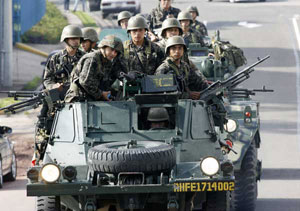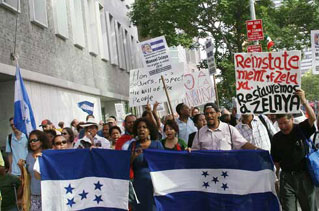(lead article)
Honduran president
ousted in army coup
Workers resist military, police repression
 
|
|
Left: Reuters/Oswaldo Rivas. Right: Militant/Brian Williams
|
|
Left: Honduran soldiers arrive at presidential home in military coup June 28. Right: March against coup to UN Building in New York June 29.
|
BY SETH GALINSKY
July 1—Honduran president Manuel Zelaya was ousted by the military June 28. Zelaya is among a number of presidents elected in Latin America over the last half decade who have promised social reforms as the pressures of the spreading capitalist economic crisis bears down upon working people across the region.
Soldiers grabbed Zelaya at gunpoint at his home in the early morning and forced him to board a plane to Costa Rica. The coup took place just hours before a referendum on calling a constitutional convention that could end term limits for the presidency was to take place. The Honduran congress voted to replace Zelaya with Roberto Micheletti, the owner of a large transportation business and former Zelaya ally. The Honduran Supreme Court also ratified the coup.
So far no government has recognized the new regime.
The military has been unable to quell protests against the coup despite imposing an evening curfew and cutting off electricity to much of Tegucigalpa, the capital.
Three thousand protesters blocked entrances to the Presidential Palace June 29 but were dispersed by soldiers and police who fired rubber bullets and pepper spray. Among the demonstrators were many laborers, taxi drivers, peasants, and indigenous people, according to the Associated Press. There have also been protests against the coup in other parts of the country.
Supporters of the coup demonstrated June 30 in Tegucigalpa and San Pedro Sula.
President Barack Obama said he was “deeply concerned.” High-ranking U.S. officials denied charges that Washington had encouraged the coup. A senior Obama administration official said that Washington had been in close contact with Honduran government and military officials opposed to Zelaya, but that the Honduran military broke off discussions shortly before the coup.
Washington has a long-standing relationship with the Honduran military. There are currently 600 U.S. troops stationed at a Honduran air base about 50 miles northwest of Tegucigalpa.
U.S. corporate giants Chiquita and Dole control a large part of the country’s agricultural export market.
Zelaya, a wealthy rancher, became president in January 2006. He was a long-time politician in the Liberal Party, one of the main bourgeois parties in Honduras. He campaigned around the slogan “Change is needed” and promised that if he won, he and his ministers would take the bus to work.
Measures upset bosses
In October 2007 Zelaya visited Cuba, the first official visit there by a Honduran president in 46 years.
In August 2008 he led Honduras to join the Bolivarian Alternative for the Americas, an economic alliance spearheaded by Venezuelan president Hugo Chávez that seeks to counter U.S. economic power in the region and in particular trade agreements favoring Washington.
One measure that particularly upset business owners was a 60 percent increase in the minimum wage early this year.
In March Zelaya called for a referendum asking voters to back convening an assembly to write a new constitution, including changes that would allow him to run for a second term.
Zelaya fired Gen. Romeo Vasquez Velasquez, the head of the military June 24 when he refused to ensure the referendum would take place. The Supreme Court then overturned the firing.
On June 26 Zelaya led thousands of supporters to an air force base where ballots for the referendum were being held, taking them to the presidential palace for safekeeping.
As the coup was under way, Patricia Rodas, the Honduran minister of foreign relations, asked the Venezuelan, Nicaraguan, and Cuban embassies for diplomatic protection. After the ambassadors arrived at her home, a dozen or more masked soldiers burst in. All three ambassadors grabbed hold of Rodas to prevent them from carrying her off. The goons succeeded in pulling off the Nicaraguan and Venezuelan ambassadors. But they couldn’t loosen the hold of Cuban ambassador Juan Carlos Hernández.
The soldiers threw Rodas and Hernández into a van and headed to the air force base where they finally managed to pull the two apart. Rodas was later put on a plane to Mexico. Some workers helped Hernández get back to the Cuban embassy after he had been dumped along a roadside.
Cuba condemns coup
Cuban president Raúl Castro strongly condemned the coup. Now is the moment “to unmask those who condemn, but afterwards are applauding under the table, like has happened so many times in our history,” he said, in a clear reference to Washington. “There can be no negotiations with the coup leaders, nor any conditions or demands of any type placed on the legitimate government of President Zelaya.”
On June 30 Zelaya spoke before the UN General Assembly in New York. The assembly approved by acclamation a resolution calling for the restoration of Zelaya. The resolution was sponsored by the governments of Bolivia, Cuba, Ecuador, Venezuela, Mexico, the United States, and others.
After the UN vote, Zelaya announced that he will return to Honduras July 4 to finish the remaining six months of his presidential term.
| 


